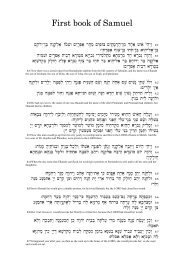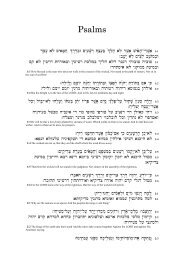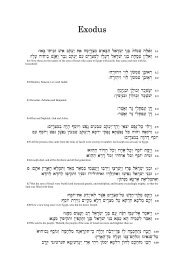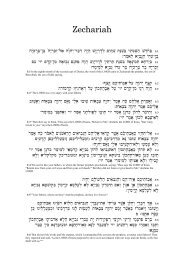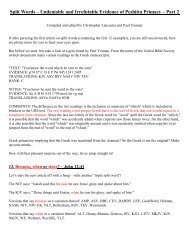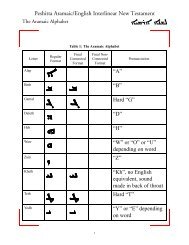ana translation
Untitled - Peshitta Aramaic/English Interlinear New Testament
Untitled - Peshitta Aramaic/English Interlinear New Testament
- No tags were found...
Create successful ePaper yourself
Turn your PDF publications into a flip-book with our unique Google optimized e-Paper software.
2 PET. in. 1-5]<br />
SUPPLEMENTAL NOTES. 113<br />
It is the proper equivalent of the Gr. (etAi/cpu/?} : as Clement R., ii. 9,<br />
where the Syr. renders eiXi/cpti/eis by }u.2l (Bensly's Epp. of S. Clement<br />
in Syr., p. -i).<br />
The commoner word = }'r *.Zi<br />
( /caAo9, so 3, 7, 8, 10, 13)<br />
has naturally been substituted by transcribers, so early that it has<br />
misled Arab., as well as Etzel, and all editors ;<br />
and yet it is found in<br />
no extant codex earlier than the xivth century (except probably 3,<br />
which may be of xinth). As a rendering<br />
it is quite inadequate. It is<br />
to be noted here, that 1, which heads our list of witnesses to }^2ls,<br />
has at this point been altered (whether by the scribe or by a later hand)<br />
by interlining > : an instance like that noted in the Note (b) supr., on<br />
i. 4, to show that whatever rehandling this codex may have undergone,<br />
has been in the direction of divergence from, not of conformity to,<br />
Harkl.<br />
Ib., 2 and 4. In these verses we have two instances of the concurrence<br />
of 1 and 2 in readings which are indefensible :<br />
In ver. 2, the insertion by codd. 1, 2 of .Ol-^O after t^O> (<br />
= rov<br />
Kvpcov fjfjiwv Kal eov T^UOJV),<br />
has no support from any Greek or other<br />
authority, except from our codex 3 (which elsewhere often agrees<br />
with the manuscripts of the earlier group).<br />
It is an obvious interpolation<br />
in the interests of orthodoxy, to be unhesitatingly rejected, though<br />
attested by our best Syr. witness 1 and its associate 2.<br />
In ver. 4, )AiiD (<br />
= KaTeCTKevacrTcu), for )AoSsD ^Sta/xei/cr, as all Gr.) is<br />
another misreading of 1 and 2, against the rest, but in this case an<br />
accidental one, the words being closely alike to the eye.<br />
3. For the participle >^oVn (<br />
= e'/xTrai'^ovres) in this place, cp. the<br />
parallel, Jud. 18, and footnotes on Gr. text of both. The two passages<br />
seem to have been altered into verbal agreement in the Syr. of our<br />
translator, but not of Harkl.<br />
5. The omission of JJL.I after .OdX in this verse,<br />
is a like case with<br />
the substitution of *);*> in verse 1, being supported by the same<br />
late codices (3, 7, 8, 10, 13) with Arab, and the Polyglots, and opposed<br />
by the same better evidence (of 1, 2, 11, 12, 14, 18, 20, but not 19,<br />
which here changes sides) reinforced by 9, also by Etzel (who passes<br />
over to the earlier group). In this instance, Lee and the American<br />
Editor correct the text (after<br />
9 and 11).<br />
Ib. The words ]*& r*^O are attested by all our codices, as by all<br />
Gr. and other authorities ;<br />
but Harkl. inserts them with the mark * .<br />
p



